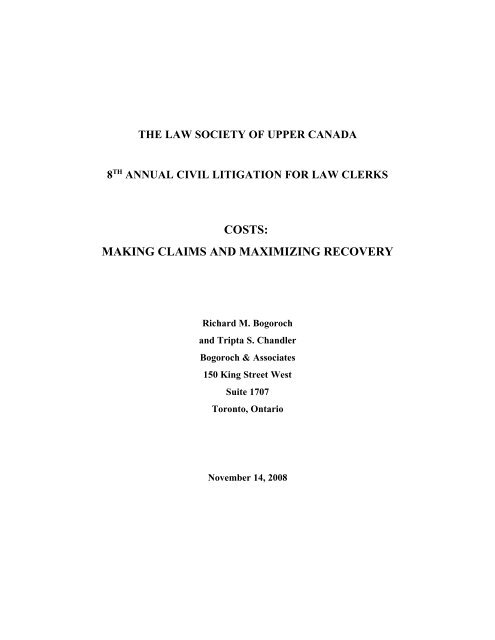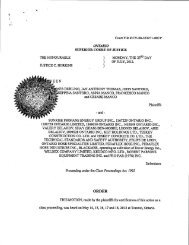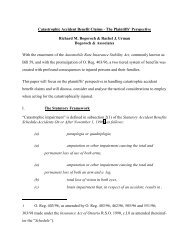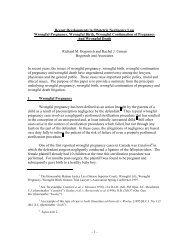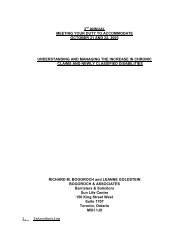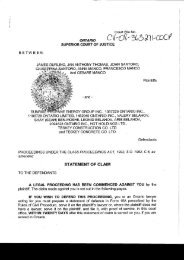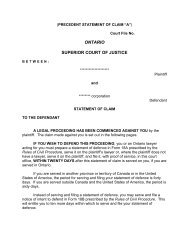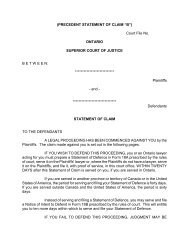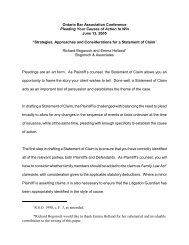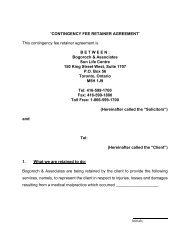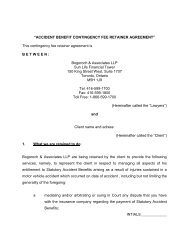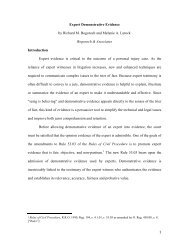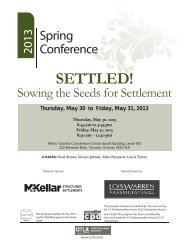Costs - Bogoroch & Associates
Costs - Bogoroch & Associates
Costs - Bogoroch & Associates
You also want an ePaper? Increase the reach of your titles
YUMPU automatically turns print PDFs into web optimized ePapers that Google loves.
THE LAW SOCIETY OF UPPER CANADA<br />
8 TH ANNUAL CIVIL LITIGATION FOR LAW CLERKS<br />
COSTS:<br />
MAKING CLAIMS AND MAXIMIZING RECOVERY<br />
Richard M. <strong>Bogoroch</strong><br />
and Tripta S. Chandler<br />
<strong>Bogoroch</strong> & <strong>Associates</strong><br />
150 King Street West<br />
Suite 1707<br />
Toronto, Ontario<br />
November 14, 2008
I. INTRODUCTION<br />
<strong>Costs</strong> are an often overlooked aspect of civil litigation until the time comes to negotiate settlement.<br />
However, there are many occasions during the course of litigation, from the time the lawsuit is<br />
commenced to the motions stage and during trial preparation, where it is important for the parties to<br />
consider the various costs provisions and their impact on the decisions made during the litigation<br />
process.<br />
It is not an understatement to state that the majority of the steps taken in a lawsuit can have costs<br />
consequences. The factors a court may take into consideration in awarding costs are broad and wideranging.<br />
Rule 57 of the Rules of Civil Procedure, in particular, grants the court broad discretion to<br />
consider the parties’ conduct in any of the steps of the litigation and to award or withhold costs based<br />
on whether the conduct of a party was, for example, frivolous, vexatious or had the effect of<br />
shortening or lengthening the proceeding. It is for this reason that it is essential to consider, at every<br />
stage of the litigation, your client’s exposure to costs when conceiving a litigation strategy.<br />
This paper will deal with costs generally and how they can be claimed, as well as certain specific<br />
situations in which there are costs consequences to a particular course of action. Although the Rules<br />
of Civil Procedure establish a framework for costs, it should always be kept in mind that ultimately,<br />
the discretion of the court is paramount.<br />
II.<br />
GENERAL PRINCIPLES<br />
As a law clerk, you are likely primarily responsible for the preparation of bills of costs and lists of<br />
assessable disbursements, which can often seem like daunting task. In order to make the process<br />
easier, it is essential that you familiarize yourself with the Rules of Civil Procedure; in particular,<br />
Rules 57 and 58 and Tariff A, which provides a guideline for the fees and disbursements which may<br />
be claimed in the course of an action.<br />
-2-
The first principle applicable to the assessment of costs is found in s. 131 of the Courts of Justice Act,<br />
which reads as follows:<br />
s. 131(1) Subject to the provisions of an Act or rules of court, the costs of and<br />
incidental to a proceeding or a step in a proceeding are in the discretion of the court,<br />
and the court may determine by whom and to what extent the costs shall be paid.<br />
This provision sets out the basic principle which must always be kept in mind with respect to any<br />
claim for costs of a motion, application, action or other proceeding: that any award of costs is entirely<br />
subject to the discretion of the judge or master hearing the matter, unless there is a specific rule or<br />
tariff which applies. Therefore, in preparing a bill of costs or a list of disbursements, specific<br />
reference should first be made to the Rules and Tariff A, which provide guidelines as to how to<br />
formulate such claims and which also set out the factors a court may consider in awarding costs.<br />
There are two types of costs which may be awarded, depending on the situation. The two types of<br />
costs are differentiated by the scale on which they are awarded (i.e., the amounts which the parties<br />
are entitled to claim). The lesser of the two is known as “partial indemnity costs”.<br />
Rule 1.03(1) defines partial indemnity costs as “costs awarded in accordance with Part I of Tariff A”,<br />
which means that in preparing a bill of costs claimed on a partial indemnity basis, you must refer<br />
directly to the Tariff as a starting point.<br />
<strong>Costs</strong> may also (although less frequently) be awarded on a substantial indemnity basis. Substantial<br />
indemnity costs are defined in Rule 1.03(1) as “costs awarded in an amount that is 1.5 times what<br />
would otherwise be awarded in accordance with Part I of Tariff A”. In other words, substantial<br />
indemnity costs are simply one and one-half times the amount of partial indemnity costs. Knowing<br />
when to claim either partial or substantial indemnity costs is therefore essential and will be discussed<br />
further below.<br />
-3-
III.<br />
THE RULES OF CIVIL PROCEDURE<br />
A. How <strong>Costs</strong> are Calculated<br />
Rule 57, “<strong>Costs</strong> of Proceedings”, deals specifically with costs awarded for and against parties to a<br />
lawsuit, while Rule 58, “Assessment of <strong>Costs</strong>”, governs the court’s discretion in determining the<br />
amount of costs payable in a particular situation.<br />
As stated above, the court has tremendous discretion in awarding costs. However, the preamble to<br />
Rule 57, entitled “Information for the Profession”, sets out maximum rates for various legal<br />
professionals, which are generally considered by the court and which are considered to be applicable<br />
to claims for partial indemnity costs:<br />
Law Clerks<br />
Students-at-law (articling students)<br />
Lawyers (less than 10 years from date of call)<br />
Lawyers (10-20 years from date of call)<br />
Lawyers (more than 20 years from date of<br />
call)<br />
Maximum of $80.00 per hour<br />
Maximum of $60.00 per hour<br />
Maximum of $225.00 per hour<br />
Maximum of $300.00 per hour<br />
Maximum of $350.00 per hour<br />
Substantial indemnity costs are calculated by multiplying these maximum hourly rates by 1.5.<br />
B. Factors Considered in Awarding <strong>Costs</strong><br />
Rule 57.01(1) consists of a list of factors which the court may consider in awarding costs. The list<br />
includes the amount of time actually spent, the amounts claimed and recovered, and the complexity<br />
of the proceeding. Perhaps most importantly, the court may also consider the actions of the parties<br />
to the litigation; in particular, whether the parties acted improperly, whether their actions prolonged<br />
or shortened the proceeding, and the parties’ refusal to admit matters that should have been admitted.<br />
-4-
In addition to the discretion provided under s. 131 of the Courts of Justice Act, Rule 57.01(1)(i) also<br />
permits the court to consider “any other matter relevant to the question of costs”.<br />
From the law clerk’s perspective, many of the discretionary factors considered by the court will not<br />
be considered when formulating a bill of costs. However, the clerk should be diligent in recording<br />
the actual time spent by the various individuals involved in the proceeding and should also consult<br />
with the lawyer handling the matter to ensure that the claim made is in proportion to the type of<br />
proceeding (its complexity and length) and also bears some reasonable relationship to the amounts<br />
claimed in the proceeding itself.<br />
C. Procedures for Claiming <strong>Costs</strong><br />
Rule 57.01(6) requires every party to a proceeding who intends to make a claim for costs to give to<br />
every other involved party and bring to the hearing a costs outline (Form 57B, a copy of which is<br />
attached). It is important to note that the costs outline may not exceed three pages in length.<br />
A review of Form 57B clearly sets out the court’s expectations in terms of what information is<br />
required to make a claim for costs. The factors for the court’s consideration set out in Rule 57.01(1)<br />
must be clearly addressed and should be completed in consultation with the lawyer handling the<br />
matter. It is also notable that claims for fees must be clearly described in terms of the type of work<br />
done: drafting material, legal research, preparationtime, hearing time, etc., and the clerk assisting with<br />
the matter should be careful to review the lawyer’s dockets with them to ensure that the claims made<br />
are accurate. Finally, the form also requires that a list of disbursements claimed be attached as an<br />
appendix, a task that requires the law clerk to make specific reference to Tariff A to determine which<br />
disbursements may be properly claimed.<br />
In addition to the costs outline, Rule 57.01(5) set out a specific procedure following a trial, the<br />
hearing of an application, or the hearing of a motion that disposes of a proceeding (such as a<br />
-5-
successful summary judgment motion). The rule requires a successful party who is awarded costs to<br />
serve a bill of costs (Form 57A, a copy of which is attached) on all other parties and to file the bill<br />
with the court.<br />
Unlike Form 57B, Form 57A does not require that the successful party address the factors to be<br />
considered by the court in awarding costs, as this form is used only when costs have been awarded<br />
(but presumably when the quantum of the costs has not yet been determined). The form also deals<br />
with both fees and disbursements, and requires that supporting evidence be provided.<br />
In completing the form, you must follow Tariff A, which means that the amounts claimed for fees<br />
should be set out as in Form 57B. In addition, dockets or other supporting evidence of fees<br />
claimed must be attached. Similarly, when quantifying disbursements, Tariff A must be followed<br />
and each disbursement claimed must be placed under the appropriate category of permitted<br />
disbursements. Supporting invoices are also required. The form concludes with a “Statement of<br />
Experience”, which is simply a table containing the name of the lawyer(s) for whom a claim for fees<br />
is being made and their year of call.<br />
D. Other Matters<br />
Under Rule 57.03(1), when costs are ordered on a contested motion, the court is required to fix costs<br />
and order them to be paid within 30 days, “unless the court is satisfied that a different order would<br />
be more just”. Therefore, it is reasonable to expect that on a motion, the unsuccessful party will be<br />
required to pay costs ordered within 30 days. This deadline should be carefully adhered to, as<br />
the failure to pay costs within the applicable timelines carries with it severe sanctions,<br />
including the dismissal or stay of the proceeding or the striking of the party’s statement of<br />
defence (Rule 57.03(2)).<br />
On a motion made without notice, the general rule is that there will be no costs ordered (Rule<br />
57.03(3)).<br />
-6-
IV.<br />
TARIFF A<br />
In reading this paper, it becomes apparent that Tariff A (attached) bears primary importance in<br />
preparing bills of costs and disbursements. Part I of the Tariff deals with fees and instructs the drafter<br />
to refer to Rule 57 (discussed above).<br />
Part II of the Tariff governs disbursements and contains an exhaustive list of permissible<br />
disbursements, including witness fees, court fees, fees for transcripts, the costs of expert reports and<br />
other items. Disbursements may not be claimed if they do not appear in the Tariff. However,<br />
s. 35 of Tariff A allows the court the discretion to order payment of “any other disbursement<br />
reasonably necessary for the conduct of the proceeding”, which permits the successful party to claim<br />
additional disbursements not specifically provided for in the Tariff, if the expenses can be justified.<br />
V. COSTS CONSEQUENCES IN SPECIFIC CASES<br />
In certain cases, there are specific rules which govern the manner in which costs are calculated. These<br />
cases generally arise when a party has failed to comply with the rules of court or when an offer to<br />
settle has been made.<br />
A. <strong>Costs</strong> Consequences of the Choice of Court<br />
Rule 57.05(1) provides that where a plaintiff brings an action in Superior Court and is awarded an<br />
amount which is within the monetaryjurisdiction ofthe Small Claims Court ($10,000.00), the plaintiff<br />
may be barred from recovering costs, even if (s)he is successful in the proceeding.<br />
Similarly, there are costs consequences when a plaintiff fails to bring an action within the Simplified<br />
Rules (Rule 76) and is awarded an amount which is less than or equal to the $50,000.00 limit (not<br />
including interest and costs) for such cases. In the event that a party (plaintiff or defendant)<br />
commences an action in the by the ordinary procedure and subsequently chooses to transfer the case<br />
-7-
into simplified procedure, the transferring party is liable to pay the costs of the opposing party on a<br />
substantial indemnity basis for all costs, up to the date of the transfer, which would not have been<br />
incurred had the action been commenced under simplified procedure (Rule 76.13(1)).<br />
Similarly, a plaintiff may be denied costs unless the action was either commenced under the simplified<br />
rules or “the court is satisfied that it was reasonable for the plaintiff” to have commenced or continued<br />
the action under the ordinary procedure (Rule 76.13(3)).<br />
B. <strong>Costs</strong> Consequences of the Failure to make Admissions<br />
Rule 51.04 provides that where a party has been served with a Request to Admit (under Rule 51.02)<br />
and has refused to admit the truth of a fact or the authenticity of a document and that fact or<br />
document is subsequently proved at the hearing, the court may consider this in awarding costs. The<br />
same rule applies to any refusal to admit “anything that should have been admitted”, even if no<br />
Request to Admit is delivered (see Rule 57.01(1)(g)).<br />
C. Rule 49 Offers to Settle<br />
Rule 49 of the Rules of Civil Procedure governs offers to settle made in relation to any court<br />
proceeding. The importance of a Rule 49 offer is that it positions the parties in relation to costs and<br />
creates an element of risk for both sides. The impact of a Rule 49 offer is as follows (Rule 49.10):<br />
1. If a Plaintiff makes a Rule 49 offer and is awarded a sum which is equal to or greater than<br />
the amount offered, the Plaintiff is entitled to costs on a partial indemnity basis up to the<br />
date of the offer and on a substantial indemnity basis from the date of the offer.<br />
2. If a Defendant makes an offer and the Plaintiff is awarded a sum which is equal to or less<br />
than the amount offered, the Plaintiff is entitled to costs on a partial indemnity basis up<br />
to the date of the offer and the Defendant is entitled to costs on a partial indemnity basis<br />
from the date the offer was made.<br />
-8-
In order to make a valid Rule 49 offer, the following requirements must be met (Rule 49.10):<br />
1. The offer must be made at least seven days before the commencement of the hearing;<br />
2. The offer must not be withdrawn or expire prior to the commencement of the hearing; and<br />
3. The offer must not be accepted by the opposing party.<br />
For these reasons, a Rule 49 offer to settle is an important tactical tool in maximizing the recovery<br />
of costs.<br />
VI.<br />
CONCLUSION<br />
It is important that law clerks not underestimate the importance of being well-versed in the Rules and<br />
associated Tariffs, which must be used as the first points of reference at any time Bills of <strong>Costs</strong> are<br />
prepared in relation to any court proceeding. Similarly, it is essential to keep costs consequences in<br />
mind when making any decisions as to how to proceed with an action.<br />
-9-


